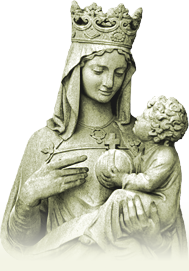Church
Antichrist Alert! Cardinal Biffi Rouses the Church
Sandro Magister
ROMA, June 3, 2005 – Cardinal Giacomo Biffi, now 77, was archbishop of Bologna from 1984 to 2003. A theologian and a great scholar of Saint Ambrose, he has assembled some of his writings which are not strictly theological in a volume recently published by Cantagalli.
The title of the book: "Pinocchio, Peppone, l’Anticristo e altre divagazioni [Pinocchio, Peppone, the Antichrist, and other Meanderings].”
The Antichrist referred to in the title is the one described by Russian philosopher and theologian Vladimir Sergeyevich Soloviev in the last book he wrote before his death in 1900: "The Three Dialogues and the Story of the Antichrist."
Why does Cardinal Biffi want to bring this back to everyone's attention today? Because – he writes ¿– "Soloviev announces with prophetic clarity the great crisis that afflicted Christianity during the last decade of the 20th century."
In the figure of the Antichrist as described by Soloviev, Biffi sees "the emblem of the confused and ambiguous religious identity of the times we are living in now." He sees the singling out and criticism of "principled Christianity," an emphasis on "openness," obsession with "dialogue" at all costs, "in which there seems to remain little of the unique and incomparable person of the Son of God who was crucified for us, rose from the dead, and is now alive. It is the situation that Fr. Divo Barsotti denounced in an extraordinary, and extraordinarily true, statement, when he said that in the Catholic world of our time, Jesus Christ is too often simply an excuse to talk about something else."
In Soloviev's tale, the Antichrist is elected president of the United States of Europe, acclaimed as emperor in Rome, takes possession of the entire world, and finally imposes his command even over the life and organization of the Churches. But what Cardinal Biffi calls to attention is not this series of events, but rather the personal characteristics of the Antichrist. Here follow a few passages from his essay, which deserves to be read in its entirety, in which the cardinal summarizes these personal traits and explains what lesson they hold for the Church of today:
The days are coming, and are already here…
by Giacomo Biffi
The Antichrist, says Soloviev, was "a convinced spiritualist." He believed in goodness, and even in God. He was an ascetic, a scholar, a philanthropist. He gave "the greatest possible demonstrations of moderation, disinterest, and active beneficence."
In his early youth, he had distinguished himself as a talented and insightful exegete: one of his extensive works on biblical criticism had brought him an honorary degree from the University of Tübingen.
But the book that had gained for him universal fame and consensus bore the title: "The Open Road to Universal Peace and Prosperity," in which "a noble respect for ancient traditions and symbols was joined with a sweeping, audacious radicalism toward social and political needs and directives. Limitless freedom of thought was united with a profound comprehension of everything mystical; absolute individualism with an ardent dedication to the common good; the most elevated idealism toward guiding principles with the complete precision and viability of practical solutions."
It is true that some men of faith wondered why the name of Christ did not appear even once, but others replied: "If the contents of the book are permeated with the true Christian spirit, with active love and universal benevolence, what more do you want?" Besides, he "was not in principle hostile to Christ." On the contrary, he appreciated his right intentions and lofty teaching.
But three things about Jesus were unacceptable to him.
First of all, his moral preoccupations. "The Christ," he asserted, "has divided men according to good and evil with his moralism, whereas I will unite them with the benefits that both good and evil alike require."
He also did not like Christ's "absolute uniqueness." He was one of many, or even better – he said – he was my precursor, because I am the perfect and definitive savior; I have purified his message of what is unacceptable for the men of today.
Finally, and above all, he could not endure the fact that Christ is alive, so much so that he repeated hysterically: "He is not among the living, and will never be. He is not risen, he is not risen, he is not risen. He rotted, he rotted in the tomb…"
But where Soloviev's presentation shows itself to be particularly original and surprising – and merits greater reflection – is in the attribution to the Antichrist of the qualities of pacifist, environmentalist, ecumenist. […]
Did Soloviev have a particular person in mind when he made this description of the Antichrist? It is undeniable that he alludes above all to the "new Christianity" that Leo Tolstoy was successfully promoting during those years. […]
In his "Gospel," Tolstoy reduces all of Christianity to five rules of conduct which he derives from the Sermon on the Mount:
1. Not only must you not kill, but you must not even become angry with your brother.
2. You must not give in to sensuality, not even to the desire for your own wife.
3. You must never bind yourself by swearing an oath.
4. You must not resist evil, but you must apply the principle of non-violence to the utmost and in every case.
5. Love, help, and serve your enemy.
According to Tolstoy, although these precepts come from Christ, they in no way require the actual existence of the Son of the living God to be valid. [...]
Of course, Soloviev does not specifically identify the great novelist with the figure of the Antichrist. But he intuited with extraordinary clairvoyance that Tolstoy's creed would become during the 20th century the vehicle of the substantial nullification of the gospel message, under the formal exaltation of an ethics and a love for humanity presented as Christian "values." [...]
The days will come, Soloviev tells us – and are already here, we say – in which the salvific meaning of Christianity, which can be received only in a difficult, courageous, concrete, and rational act of faith, will be dissolved into a series of "values" easily sold on the world markets.
The greatest of the Russian philosophers warns us that we must guard against this danger. Even if a Tolstoian Christianity were to make us infinitely more acceptable in the living room, at social and political gatherings, and on television, we cannot and must not renounce the Christianity of Jesus Christ, the Christianity that has at its center the scandal of the cross and the astonishing reality of the Lord's resurrection.
Jesus Christ, the crucified and risen Son of God, the only savior of mankind, cannot be transformed into a series of worthwhile projects and good inspirations, which are part and parcel of the dominant worldly mentality. Jesus Christ is a "rock," as he said of himself. And one either builds upon this "rock” (by entrusting oneself) or lunges against it (through opposition): "He who falls on this stone will be broken to pieces; but when it falls on any one, it will crush him" (Mt. 21:44). [...]
So Soloviev's teaching was simultaneously prophetic and largely ignored. But we want to repropose it in the hope that Christianity will finally catch on to it and pay it a bit of attention.
__________
The Sermon on the Mount According to Martini, and According to Ratzinger
The essay by Cardinal Giacomo Biffi cited above – first drafted in 1991 and then revised in 2005 – has been published just as a homily by Cardinal Carlo Maria Martini has ignited a somewhat pertinent discussion in Italy.
Before becoming archbishop of Bologna, Biffi was Martini's auxiliary bishop. Martini was archbishop of Milan from 1980 until 2002, and has now taken up his biblical studies again in Jerusalem.
The homily that has become a matter of discussion is the one Martini delivered last May 8 at the cathedral of Milan, on the occasion of his twenty-fifth anniversary of episcopal ordination.
In it, commenting on Jesus' command "Go and teach all the nations," Martini explained that this means "teaching them to observe all that the Lord has commanded. And all that he has commanded, in Matthew, is the Sermon on the Mount, or again, Matthew 25: ‘As you did it to one of the least of these my brethren, you did it to me’.”
After this, Martini continued:
"It is this that we must teach and observe, and this sermon is very important today. I realize this living in a place of particular suffering, Jerusalem, in the Middle East, where the problems of humanity are all exposed. We all have a great need to learn how to live together amid our differences, respecting rather than destroying one another, not isolating one another, not despising one another and not simply tolerating each other, because tolerance would be too little. But I would say that this also means not attempting right away to bring about conversions, because this word raises insurmountable barriers in certain situations and among certain people. It means, instead, 'fermenting' each other in such a way that each person is brought to a deeper realization of his own authenticity, his own truth before the mystery of God.
"There is no more concrete and accessible means to achieving this end than the words of Jesus in the Sermon on the Mount. They are words that no one can reject, because they speak to us of joy, blessedness, forgiveness, loyalty, the rejection of ambition, the moderation of desire for gain, the consistency of our actions ('let your speech be yes, yes, no, no'), and sincerity. These words, spoken with the power of Jesus, touch every heart, every religion, every belief, every lack of belief. No one can say: 'These words are not for me: sincerity is not for me, loyalty is not for me, the struggle against the appropriation of the world's resources is not for me...'. It is a sermon for everyone, which unites all and calls them to their own deep authenticity, and it is this sermon that will permit us to live together amid our differences, respecting each other, not isolating each other, not destroying each other, and not even maintaining the proper distances, but 'fermenting' one another.
"If we do this, all men will recognize themselves in these values, they will feel themselves closer to one another, more like companions on a journey. They will feel that they share profound and true realities in common, realities that they might not have been able to discover without the words of Jesus. So beyond ethnical, social, and even religious and confessional differences, humanity will discover its capacity to live together, to grow in peace, to defeat violence and terrorism, to overcome reciprocal differences. It is then that the message of God's grace will be fully manifest."
This homily by Cardinal Martini was launched the following day, May 9, on the front page of the leading Italian newspaper, "Corriere della Sera," as a "manifest" alternative to the "neoconservative" line personified by pope Joseph Ratzinger.
And in effect, it is beyond a doubt that Ratzinger and Martini speak with different accents.
On Sunday, May 29, in his homily for the mass of Corpus Domini in Bari, Benedict XVI commented on the words of Jesus in Jn 6:53: "Truly, truly I say to you: unless you eat the flesh of the Son of man and drink his blood, you have no life in you." They were words that had disturbed some of his disciples. The pope said:
"In the face of the murmur of protest, Jesus might have fallen back on reassuring words: 'Friends,’ he could have said, 'do not worry! I spoke of flesh but it is only a symbol. What I mean is only a deep communion of sentiments.’ But no, Jesus did not have recourse to such soothing words. He stuck to his assertion, to all his realism, even when he saw many of his disciples breaking away (cf. Jn 6: 66). Indeed, he showed his readiness to accept even desertion by his apostles, while not in any way changing the substance of his discourse: 'Do you want to leave me too?' (Jn 6: 67), he asked. Thanks be to God, Peter's response was one that even we can make our own today with full awareness: 'Lord, to whom shall we go? You have the words of eternal life' (Jn 6: 68)."
As for the Sermon on the Mount, in a book first published in 1989, "Guardare Cristo. Esercizi di fede, speranza e carità [Gazing Upon Christ: Exercises in Faith, Hope, and Charity],” Ratzinger writes:
"In order to grasp the true profundity of the Beatitudes, we must shine the light upon an aspect that is rarely considered in modern exegesis, but which in my judgment is decisive for a realistic interpretation of the Sermon on the Mount as a whole. I mean the Christological dimension of this text. [...] The hidden subject of the Sermon on the Mount is Jesus. The Sermon on the Mount is not an exaggerated and unreal moralism, which would lose any concrete relation to our life and seem impracticable on the whole. Neither is it – as the opposite hypothesis maintains – simply a mirror in which one sees that all are and remain sinners in everything, and that they can attain salvation only by unconditional grace. With this opposition of moralism and the pure theory of grace, one does not enter within the text; one rather removes it farther from oneself. Christ is the center uniting these two things, and it is only the discovery of Christ in the text that opens it up for us and makes it become a word of hope. If we explore the Beatitudes to their depths, we find Jesus everywhere as the hidden subject. He is the one who shows what it means to 'be poor in the Holy Spirit.' He is the afflicted one, the meek, the one who hungers and thirsts for justice, the merciful one. He is pure of heart, it is he who brings peace, the one persecuted for the sake of justice. All the words of the Sermon on the Mount are flesh and blood in him. The Sermon on the Mount is a call to the imitation of Jesus Christ. Only he is 'perfect as our Father in heaven is perfect' (Mt 5:48). We cannot by ourselves be ‘perfect as our Father in heaven is perfect,’ but we must be so in order to correspond to the demands of our nature. We cannot do this, but we can follow Jesus, cling to him, 'become his own.' If we belong to him as his members, we become by participation what he is; his goodness becomes our own. The words of the Father in the parable of the prodigal son are realized in us: all that is mine is yours (Lk 15:31). The moralism of the sermon, which is too difficult for us, is gathered up and transformed in communion with Jesus, in being disciples of Jesus, in his friendship and trust."
__________
The new book by Giacomo Cardinal Biffi from which the passage on the Antichrist was taken:
Giacomo Biffi, "Pinocchio, Peppone, l’Anticristo e altre divagazioni [Pinocchio, Peppone, the Antichrist, and other Meanderings],” > Cantagalli, Siena, 2005, pp. 256, euro 14,90.
The Antichrist is referred to in three passages of the New Testament.
The first letter of John, 4:3 : "Every spirit which does not confess Jesus is not of God. This is the spirit of Antichrist, of which you heard that it was coming, and now it is in the world already."
The second letter of John, 1:7 : "For many deceivers have gone out into the world, men who will not acknowledge the coming of Jesus Christ in the flesh; such a one is a deceiver and the Antichrist."
The second letter of Paul to the Thessalonians, 2:3-5 : "Let no one deceive you in any way; for that day will not come, unless the rebellion comes first, and the man of lawless is revealed, the son of perdition, who opposes and exalts himself against every so-called God or object of worship, so that he takes his seat in the temple of God, proclaiming himself to be God. Do you not remember that when I was still with you I told you this?"
Para citar este texto:
"Antichrist Alert! Cardinal Biffi Rouses the Church"
MONTFORT Associação Cultural
http://www.montfort.org.br/eng/veritas/igreja/perigo_anticristo/
Online, 28/04/2025 às 00:44:47h








